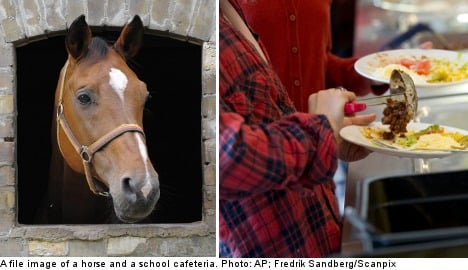“The lasagne has been delivered to all sorts of customers, both within the public sector, like schools and hospitals, and to restaurants,” Christina Gezelius, a spokeswoman for Swedish catering firm Martin & Servera, told the TT news agency.
The Swedish food wholesaler has ordered tests on samples from bulk lasagne shipments from Comigel, the French company that also produced frozen lasagne meals found to contain up to 99 percent horsemeat for Swedish food company Findus.
“We stopped sales on Friday as a precautionary measure. We’ve identified 80 customers from whom we will recall what’s left out there,” Martin & Servera marketing head Nils Berntsson told Svergies Radio (SR).
“It’s totally unacceptable that we’ve ended up in this situation. Our customers must be able to trust the information we provide.”
The meat was delivered to Comigel via the French meat handling company Spanghero, which, according to French media reports, falsified documents with information about the meat.
In France, food safety officials visited the Comigel and Spanghero plants on Monday, while the prime minister of Romania rejected accusations that slaughterhouses in the country were to blame for the growing scandal, saying “no irregularities” had been committed by the companies.
“We have made verifications…There exists no violation of European rules and standards” by the two abattoirs, Prime Minister Victor Ponta told a news conference.
Meanwhile, representatives from the food industry in Sweden were called to crisis talks with officials from the National Food Agency (Livsmedelsverket) to discuss how to combat the scandal and prevent future meat fraud.
Agriculture and Rural Affairs Minister Eskil Erlandsson has said he thinks Findus should be reported to the police.
“We need to come down hard on things like this so that no one even considers putting something on the market that isn’t what its list of ingredients indicates,” he told the TT news agency.
Swedish grocery chains Ica, Axfood, and Coop also risk being reported to the police because they also sold lasagne from Comigel.
TT/The Local/dl



 Please whitelist us to continue reading.
Please whitelist us to continue reading.
Member comments